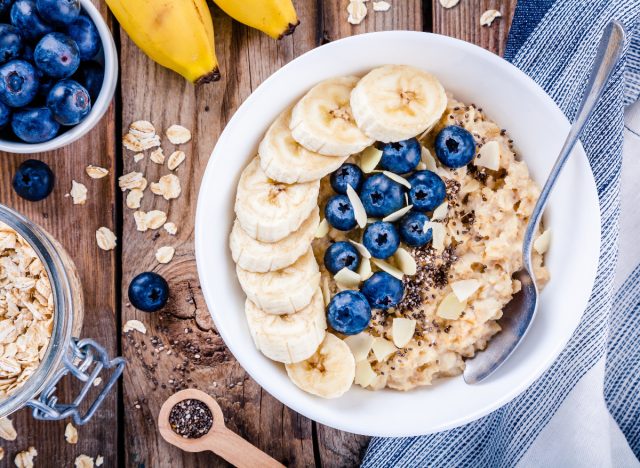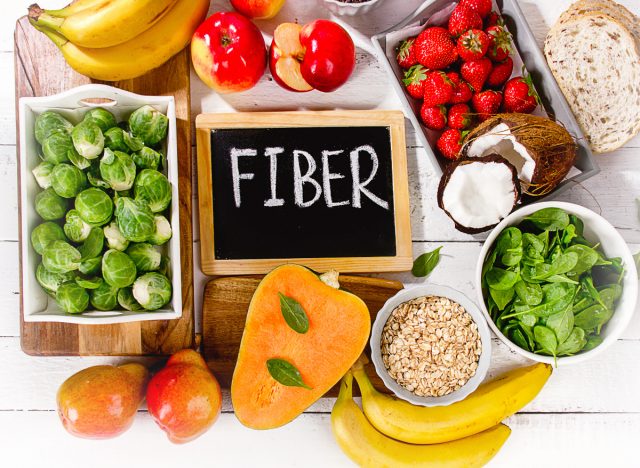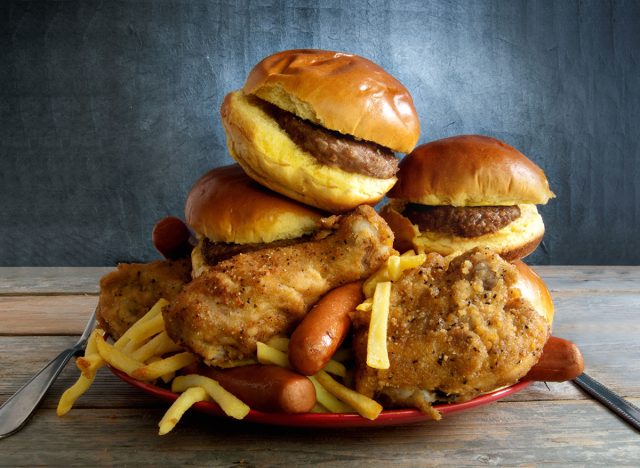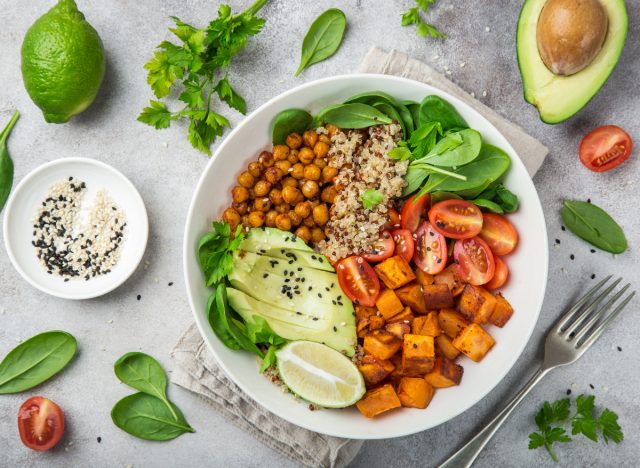5 Eating Habits for Weight Loss and Muscle Gain, Experts Say

Shedding pounds while building muscle is no small feat. These common fitness goals are tough enough on their own, but trying to accomplish them simultaneously can be overwhelming. Doing so requires discipline, perseverance, consistency, and hard work. However, you can exercise with monk-like discipline and clockwork consistency, do hours of cardio, and lift all the weights in the gym, but if your eating habits and nutrition aren't dialed in, you're doing all that for nothing. The good news is that developing healthy eating habits to fuel your fitness and weight loss goals isn't as complicated as you'd think. Today, we're here to share some solid eating habits to lose weight and gain muscle. If you're intrigued, keep reading.
Most importantly, establishing good eating habits doesn't mean you have to obsessively count calories, stress over every bite of food, or change your entire way of eating. Nor do they mean eliminating comfort foods and sacrificing all your favorite meals. Instead, they focus more on learning to eat intuitively and tweaking your diet over time until you begin enjoying and craving healthy whole foods that help you burn fat and shed pounds while building lean muscle.
If you're looking for expert tips and advice to help get you started on your weight-loss-muscle-building journey, we've got you covered. We spoke with registered dietitians who share some fantastic eating habits backed by science to help you lose weight and gain muscle. Keep reading to learn the best ways to improve your eating habits so you can stop chasing unattainable goals and make your fitness dreams a reality.
Eat more, not less.

It sounds counterintuitive, but eating more can actually help your weight loss goals. Oh, and don't skip meals like breakfast! "Believe it or not, frequently eating in smaller portions can help with weight loss. This is because your body is in balance and consistently receiving nutrients to stay in balance," says Blanca Garcia, RDN, registered dietitian nutritionist with Health Canal. "Skipping meals can cause you to gain weight. By the time you eat, you're often so hungry you may end up eating more than you should."
Eating smaller, more frequent meals throughout the day can help you shed pounds and build lean muscle by boosting your body's fat-burning potential. Aim to eat small, nutritionally-balanced meals containing healthy carbs, proteins, and fats every three hours or so. Protein in particular promotes weight loss and is essential for muscle protein synthesis, according to research. If you don't eat enough, your body can enter starvation mode, which hinders weight loss and muscle gain. Starvation mode causes your body to conserve calories, store fat, and burn muscle for energy instead of fat.
Cook more meals at home.

Kimberly Gomer, MS, RD, LDN, registered dietitian and nutritionist at Body Beautiful Miami, tells Eat This, Not That!, "Cooking at home is a great way to reduce the number of meals you eat out or order in. That way, you have less temptation to order foods that are unhealthy. When you cook at home, not only do you save money, but you control what's in your food and know exactly what you're eating."
Multiple studies have found that a "higher frequency of cooking and eating at home is associated with healthier diet quality, fewer calories consumed, and greater weight loss," according to an analysis published in the Nutrition Journal. Another pro tip for cooking at home is to make sauces from scratch. Instead of using store-bought or fast food sauces loaded with added sugars, sodium, and calorie-dense oils, make your sauces at home with a base made from cashew, tahini, avocado, or any other healthy whole food.
Include fiber-rich foods in each meal.

If you were to select one nutrient for overall health that was the king (or queen) of all other nutrients, you'd be hard-pressed to find a better contender than fiber. Besides making you feel full and improving digestion, fiber plays a vital role in weight loss, according to research published in the Journal of Nutrition. According to WebMD, fiber slows down digestion and boosts your blood sugar. This helps reduce cravings and prevent overeating.
While fiber doesn't directly affect muscle growth, eating fiber-rich foods improves your overall health and performance, allowing you to work out longer and harder to burn fat and gain muscle. "Fiber can be found in fruits, vegetables, legumes, and whole grain foods. High fiber intake can help limit sugar and fat absorption into your body. This, in turn, can reduce the calories the body absorbs," says Garcia.
Cut out ultra-processed foods.

One of the most powerful eating habits you can develop for any health or fitness goal is eliminating or limiting ultra-processed foods in your diet. According to the National Institutes of Health (NIH), "ultra-processed foods" include ingredients found mainly in industrial food manufacturing, including high-fructose corn syrup, hydrogenated oils, emulsifiers, and flavoring agents. These foods are major contributors to weight gain and can spike your risk of chronic disease.
"Avoid anything packaged with a long ingredient list, including sugar, processed vegetable seed oils, processed grains, chemicals, and additives," advises Gomer. "These foods cause inflammation and weight gain. In addition, the food industry purposely creates combinations of salt, sugar, and fat that become addictive, yet cannot offer satiety."
Eat more plant proteins.

In order to lose weight and gain muscle, eat foods packed with plant-based protein. The best sources include legumes (beans, lentils, chickpeas), soy products (tofu, tempeh, edamame, soy milk), quinoa, seitan, nuts, and seeds.
"When broken down into amino acids, protein becomes the building blocks of tissue growth, like muscles," explains Garcia. "Most people think meats and poultry are the best sources of protein, but unfortunately, these also come with cholesterol which can cause cardiovascular issues. Plant-based proteins are natural, clean, and are a healthy source of vitamins and minerals."








